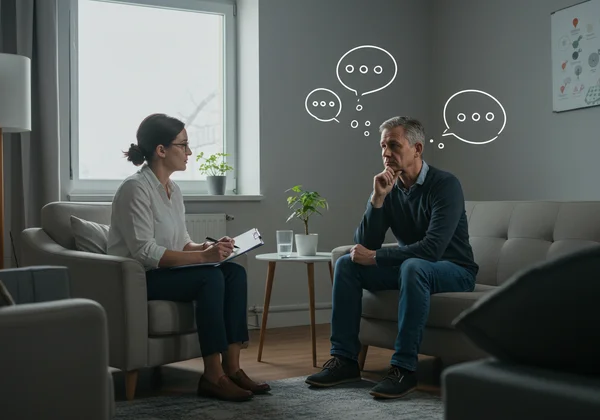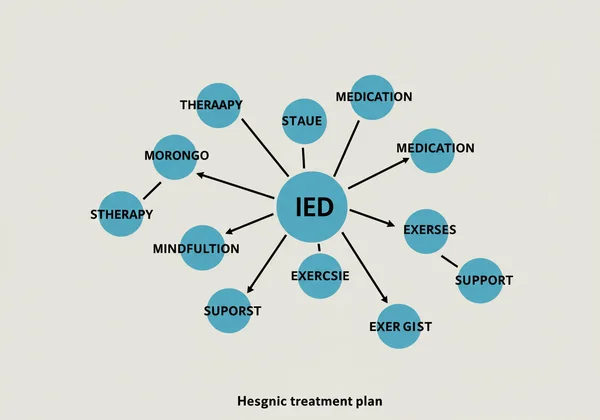Effective Treatment Options for Intermittent Explosive Disorder (IED)
August 10, 2025 | By Sophia Galloway
Are you or a loved one grappling with unpredictable bursts of anger that feel uncontrollable? You're not alone. These intense, disproportionate episodes of rage can leave you feeling isolated and ashamed, but understanding the effective intermittent explosive disorder treatment options is a crucial first step toward reclaiming peace and stability. Taking control of IED starts with understanding it and taking that brave first step. How do I know if I have IED? While a professional diagnosis is essential, gaining personal insight is a powerful starting point.
This guide explores the various therapeutic and pharmacological approaches for managing Intermittent Explosive Disorder (IED). We will delve into evidence-based strategies that can help you or someone you care about develop control over explosive impulses. If you're looking to understand your own patterns of anger, taking a free, confidential assessment can provide valuable insights to bring to a professional.
Understanding Intermittent Explosive Disorder (IED)
Before exploring treatments, it's vital to grasp what IED is. It's not simply having a "bad temper." IED is a recognized impulse-control disorder characterized by recurrent behavioral outbursts representing a failure to control aggressive impulses. These episodes can involve verbal aggression (temper tantrums, tirades) or physical aggression toward property, animals, or other individuals. The key feature is that the reaction is grossly out of proportion to any provocation.
What Does IED Feel Like? Recognizing the Patterns
For many, an IED episode feels like a sudden, overwhelming storm. It often begins with a sense of mounting tension or arousal, followed by an explosive release that feels unstoppable. During the outburst, there's a profound loss of control. Afterwards, feelings of intense regret, embarrassment, or guilt are common. Recognizing these cyclical signs of intermittent explosive disorder is a significant step toward seeking help. Many people with IED also experience symptoms of depression or anxiety, which can complicate the emotional landscape.
The Importance of Professional Diagnosis
Self-reflection is important, but it cannot replace a professional evaluation. A qualified mental health professional, such as a psychiatrist or psychologist, can provide an accurate diagnosis. They will use established criteria, like those in the Diagnostic and Statistical Manual of Mental Disorders (DSM-5), to assess your symptoms. This process ensures that other conditions with similar symptoms, like bipolar disorder or ADHD, are ruled out, allowing for a correctly tailored treatment plan. This is the most critical step toward effective management.

Therapeutic Approaches for Intermittent Explosive Disorder (IED Therapy)
Psychotherapy is the cornerstone of IED therapy. It provides the tools to understand triggers, manage emotions, and change behavioral responses. A therapist works with you to build skills for long-term stability.
Cognitive Behavioral Therapy (CBT) for IED
Cognitive Behavioral Therapy (CBT) for IED is one of the most effective therapeutic models. This approach helps individuals identify the unhelpful thoughts and beliefs that fuel their explosive anger. A CBT therapist will work with you to recognize your personal anger triggers, challenge distorted thinking patterns, and learn new problem-solving and communication skills. You'll practice relaxation techniques and develop a "coping skills toolkit" to use when you feel anger rising.

Dialectical Behavior Therapy (DBT) Skills and Anger Management
While DBT was originally developed for borderline personality disorder, its skills are highly effective for anger management. DBT emphasizes four key areas: mindfulness (staying present), distress tolerance (getting through crises without making them worse), emotion regulation (understanding and changing intense emotions), and interpersonal effectiveness (communicating needs respectfully). Learning these skills can empower you to handle triggers and emotional waves without resorting to explosive outbursts.
Group Therapy and Support Networks
The burden of IED can feel incredibly isolating, like you're facing it all by yourself. Group therapy provides a safe, structured environment where you can share your experiences with others who truly understand. Facilitated by a therapist, these support networks help reduce feelings of shame and demonstrate that you are not alone in your struggles. Hearing how others manage their symptoms and setbacks offers practical strategies and a powerful sense of community and hope.
Medication Options for IED Management
For some individuals, IED medication can be a valuable part of a comprehensive treatment plan, particularly when co-occurring conditions like anxiety or depression are present. Medication is not a cure but can help manage the underlying neurological irritability that contributes to explosive behavior. All medications must be prescribed and monitored by a qualified medical doctor or psychiatrist.
Common Medications Used to Treat IED Symptoms
No single medication is FDA-approved specifically for IED, but several types have shown effectiveness in reducing symptoms of aggression and impulsivity. These often include:
- Antidepressants: Specifically, Selective Serotonin Reuptake Inhibitors (SSRIs) like fluoxetine can help regulate mood and reduce impulsive aggression.
- Mood Stabilizers: Medications typically used for bipolar disorder, such as lithium or anticonvulsants, can help even out emotional highs and lows, reducing the likelihood of outbursts.
- Anti-anxiety agents: These may be used in the short term to manage feelings of intense agitation.
Weighing Pros and Cons: What to Discuss with Your Doctor
Choosing to use medication is a significant decision. It's essential to have an open conversation with your doctor about the potential benefits versus the possible side effects of any prescribed drug. Factors like your overall health, other medications you take, and the severity of your symptoms will influence this decision. An anger self-assessment can help you articulate your symptoms clearly during this important conversation.

Developing a Holistic Treatment Plan for IED
The most successful approach to managing IED is rarely one-dimensional. A holistic plan answers the question of how to treat intermittent explosive disorder by combining multiple strategies into a personalized and sustainable routine.
Integrating Therapy, Medication, and Lifestyle Adjustments
Real change happens when you combine professional guidance with your own daily efforts. Your plan should integrate regular therapy sessions, medication if prescribed, and crucial lifestyle adjustments. This includes practicing stress-reduction techniques like meditation or yoga, ensuring you get regular physical exercise to burn off excess energy, and maintaining a consistent sleep schedule to support emotional stability.

The Role of Ongoing Support and Self-Care
Managing IED is a continuous journey, not a one-time fix. Establishing routines for self-care is non-negotiable. This means identifying and minimizing exposure to known triggers, practicing your coping skills even on good days, and staying connected to your support system. Continually checking in with yourself, perhaps by using an our online tool periodically, can help you monitor your progress and identify emerging challenges before they escalate.
Taking the Next Step in Your Journey with IED Treatment
Living with Intermittent Explosive Disorder presents significant challenges, but it is a treatable condition. Hope and change are absolutely possible with the right support and strategies. By combining professional therapies like CBT, medication when appropriate, and dedicated self-care, you can learn to manage explosive anger and build a more peaceful, stable life.
The first step is often the hardest, but it's also the most important. If you recognize the patterns described in this guide in yourself or a loved one, it's time to act. We encourage you to start your assessment on our website. This free, confidential tool can help you organize your thoughts and provide a clear starting point for a conversation with a healthcare provider.
Frequently Asked Questions About Intermittent Explosive Disorder Treatment
Can intermittent explosive disorder be cured?
While "cure" may not be the right term, IED is highly manageable. With consistent treatment and the use of learned coping skills, individuals can significantly reduce the frequency and intensity of their outbursts, leading to a much-improved quality of life. Think of it as managing a chronic condition, where ongoing effort leads to long-term stability.
Does IED get worse with age?
If left untreated, the consequences of IED can certainly worsen over time. Damaged relationships, job loss, and legal or health problems can accumulate, increasing overall life stress. However, with effective treatment, many people find their symptoms improve as they learn and implement better emotional regulation and coping strategies. It doesn't have to get worse.
What happens if IED is left untreated?
Untreated IED can have devastating effects on nearly every aspect of a person's life. It can destroy personal and professional relationships, lead to financial and legal troubles, and contribute to chronic health issues like high blood pressure and heart disease. The persistent cycle of guilt and shame can also worsen co-occurring mental health conditions like depression and anxiety. Seeking help is vital to prevent these outcomes and understand your patterns before they cause further harm.